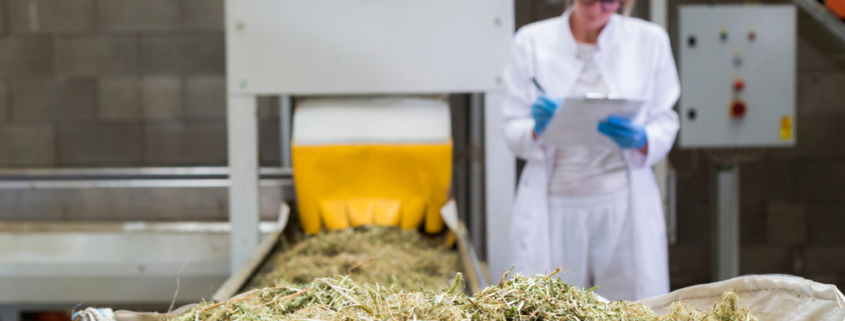In the few short years since hemp was legalized, farmers and manufacturers alike have worked to establish new processing protocols for the industry. As new hemp farms sprung up across the nation after legalization, farmers quickly realized they didn’t have all the tools they needed to pull off successful harvests. Manufacturers also didn’t have the hemp processing machines required for manufacturing seed and fiber products.
With the new national hemp industry, it’s been up to inventors, manufacturers, and farmers to develop the equipment needed to process hemp on a commercial scale. Some of this equipment has been borrowed from other industries like agriculture and food manufacturing, while other technologies have been created specifically for processing industrial hemp.
How is Hemp Processed?
While the United States hemp industry was born with no blueprints for success, the market has shown serious resilience and innovation for solving logistical issues.
The processing of industrial hemp fibers takes a number of important steps. Each of these phases is bound to pieces of technology that make specific types of manufacturing possible. While later stages in the industrial hemp supply chain can look quite different, all early stages of industrial hemp processing begin with cultivation and harvest.
Cultivation
Today, industrial hemp cultivation takes place on large commercial farms hundreds of acres in size. In order to successfully run such massive operations, hemp farmers depend on key pieces of industrial farming technology.
Primary types of hemp farming equipment include:
- Seed drill
- Transplanter
- Tractor
- Plow
- Greenhouse
- Irrigation system
Please note, every hemp farmer probably has a different list of equipment that they deem “essential.” Nonetheless, certain items like tractors and irrigation systems are almost universally used.
Harvest
After industrial hemp plants are cultivated, they must be harvested before they can be processed into fibers and seeds. As seen with cultivation, industrial hemp harvests are heavily reliant on key pieces of technology.
Important types of industrial hemp harvest equipment include:
- Combine
- Drying racks
- Drying machine
- Dehumidifier
- Bailer
Perhaps more so than cultivation, each hemp farmer has their preferred equipment choices for harvest. To illustrate, some industrial hemp farmers use drying machines, while others opt to line dry their hemp.
Equipment to Process Hemp Flowers and Seeds
Certain farmers grow industrial hemp for its seeds. In turn, these seeds are either sold to other hemp farmers for the next planting season, or they are further processed into hemp seed oil and foods. Whatever the purpose of growing industrial hemp for seeds, a hemp thresher is required to separate seeds from other plant materials.
The first step when threshing hemp is to smash up dried stems, leaves, and flowers. The idea here is to loosen the seeds from the other organic matter. Next, the hemp thresher utilizes screens and air blowers to clean excess plant materials from the seeds, while also sorting them by size.
With clean and sorted seeds in hand, manufacturers then sell the best seeds to farmers while further processing others into oils and foods.
Hemp Seed Oil Processing Equipment
Hemp seed oil is widely recognized for its high nutrition. To this end, people enjoy cooking with hemp seed oil because it provides principal nutrients like fatty acids, fiber, amino acids, as well as many important vitamins.
Hemp seed oil is processed by way of a hemp seed oil press machine. These oil press machines come in a variety of shapes and sizes. The most traditional hemp seed oil press is an expeller screw press. A more modern approach to hemp seed oil processing can be found with a hydraulic extraction press machine. Whatever your chosen press, the end goal is the same in extracting oil from hemp seeds.
With expeller screw presses, hemp seeds are added to the hopper. Next, depending on your chosen screw press, the machine presses down on the seeds by way of hand power or engine power. After that, the oil is separated from the rest of the seed material through filtration canals.
The most modern approach to hemp seed oil manufacturing is a hydraulic oil press machine. These complex pieces of equipment are designed to extract oils from seeds and nuts without degrading their nutritional value. They also come with sophisticated controls, sensors, and components for monitoring the extraction process.
Hemp Fiber Processing Equipment
For those farmers growing industrial hemp for its fibers, decortication is a critical step in hemp stalk processing. Importantly, decortication is the phase in which bast fibers are separated from hurd fibers. In turn, bast fibers are further processed into materials like lumber, paper, and fabrics. For their part, hurd fibers are used for such products as animal bedding and hempcrete.
Equipment manufacturers have developed hemp decorticators that can process up to 1,000 pounds of hemp stalks per hour. Once stalks have been processed through a hemp decorticator, the machine separates the bast and hurd into several different sizes. These different hemp fiber types and sizes can then be sold or further processed.
Hemp farmers have several choices when it comes to hemp fiber processing with decorticators. Some farmers opt to purchase their own decorticators, while others work with third-party decortication providers. In the end, financial constraints and business goals are the deciding factors in decortication practices.
Once separated, hemp bast and hurd are sometimes further processed for easier shipping. For example, hemp bast is sometimes made into bales which can be shipped without taking up too much square footage in a container.
Talk to High Grade About Industrial Hemp Processing
It is amazing to see how quickly industrial hemp processing equipment has advanced in the few short years since legalization. If you are wondering what types of equipment is best suited for your hemp farm, please contact us for expert advice.


